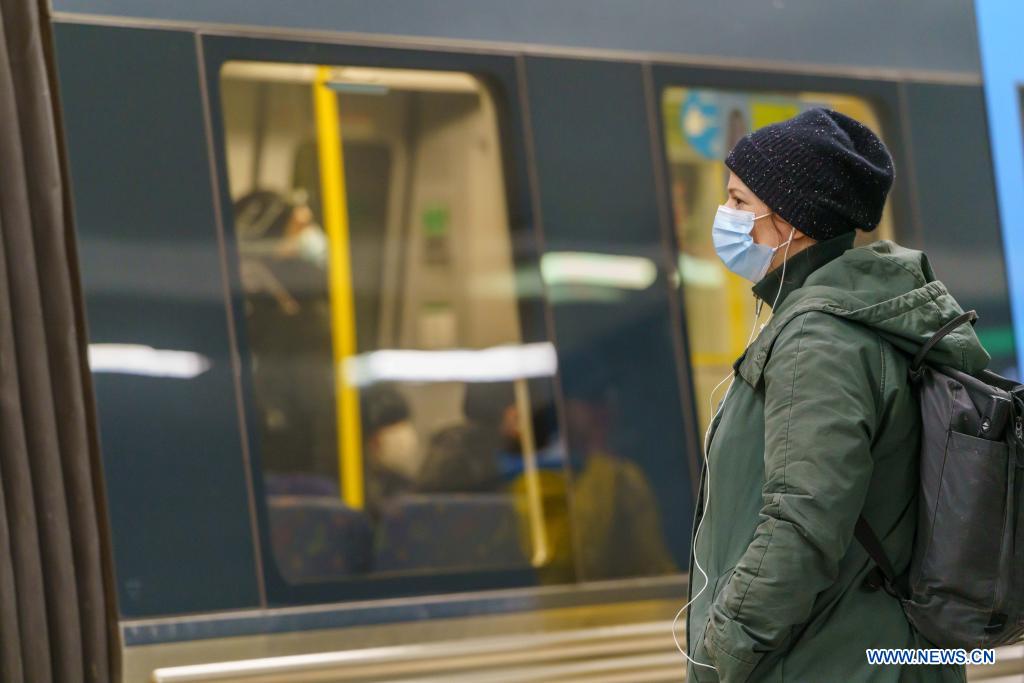
A woman wearing a face mask waits for the approaching metro train at the platform in central station in Stockholm, capital of Sweden, on May 6, 2021. Sweden reported 1 million confirmed COVID-19 cases as of Thursday with 6,526 new cases detected in the past 24 hours. (Photo by Wei Xuechao/Xinhua)
STOCKHOLM, May 6 (Xinhua) -- Sweden reported 1 million confirmed COVID-19 cases as of Thursday with 6,526 new cases detected in the past 24 hours.
It has also recorded 691.52 new cases per 100,000 inhabitants over the past 14 days, making it the hardest-hit country in the European Union, according to data from the European Centre for Disease Prevention and Control on Thursday.
Many schools were still shut down following the outbreak of the pandemic last year, and teachers and parents were critical of the way the government handled the pandemic, local media reported.
HIGH FATALITY
The death toll from the virus has reached 14,158 as of Thursday in Sweden since the pandemic started, according to date published by the Public Health Agency's press conference.
Sweden has accelerated its vaccination program in the last few weeks, and yet the national count of COVID-19 cases is believed to top a million, as Sweden may be testing more extensively than other countries, the Swedish Public Health Agency said.
Karin Tegmark Wisell, head of the department of microbiology at the Public Health Agency, admitted the number of infections in Sweden has been underestimated and that one in four Swedes may have antibodies.
Senior citizens have fallen easy victim to the virus, not the least among death cases. Up to date, 9,609 of death cases in Sweden were found in people aged 80 or older, according to data from the Public Health Agency.
The high death toll is a result of cluster outbreaks at nursing homes, especially during the first wave, critics said.
UNIQUE ROUTE
Except senior residents, other Swedes could go about their daily affairs pretty much as usual, while their elderly relatives and inhabitants had to endure strictly enforced lockdowns.
The government has taken measures to prevent the virus from entering nursing homes, and demanded distance education for high schools and university students since March last year. Restrictions on the size of crowds in public places were also put in place.
Nevertheless, the Swedish strategy was based on advice rather than curfews. The Swedish authorities took a different attitude towards the usage of facial masks.
The Public Health Agency believed masks could create a false sense of security and even increased the risks of infection if not handled properly.
The public were asked to wear face masks when using public transport in January this year, yet this is still not mandatory in Sweden.
In March last year, Dagens Nyheter newspaper revealed that a leaked email showed that a Swedish state epidemiologist took a positive attitude toward "a slow spread of infection among school children and their parents to build up herd immunity."
LESSONS LEARNED
In June last year, Ebba Busch, leader of the Swedish Christian Democrats, criticized the government's strategies.
"In February, thousands of Swedes were allowed to land at Arlanda airport from areas that already had a large spread of infection. Then they were allowed to go straight out into the community," Busch said.
However, government ministers denied that this was part of Sweden's strategy when testifying before the Committee on the Constitution last month.
They also insisted that the government never had a formal strategy and that the restrictions were imposed on an ad-hoc basis based on advices from the Public Health Agency.
Six months after Busch's criticisms, King Carl XIV Gustaf vented his frustration in his traditional Christmas interview with Swedish Television. By then Sweden had reported 7,000 COVID-19 deaths.
"I think we have failed. We have a large number who have died and that is terrible," he said.
A commission of inquiry set up by the government in June last year was more specific in its criticism.
In the first report released in December, the commission concluded that nursing homes were "ill-prepared and equipped to deal with the pandemic" and that these problems had been known for a long time.
"The current government -- as well as previous governments -- bears the ultimate responsibility for these shortcomings," the report said.
The government presented a plan that all adults in the country will be offered vaccines before mid-September.
By Thursday, a total of 2,769,411 individuals, or almost 34 percent of the adult population, had received at least one dose of vaccine. Just over 794,000 individuals, or 9.7 percent of the adult population, were fully vaccinated.
At the press conference on Thursday, the Public Health Agency warned that the situation might worsen despite the vaccinations and asked all Swedes to strictly follow the authorities' advice on the prevention of the pandemic. Enditem